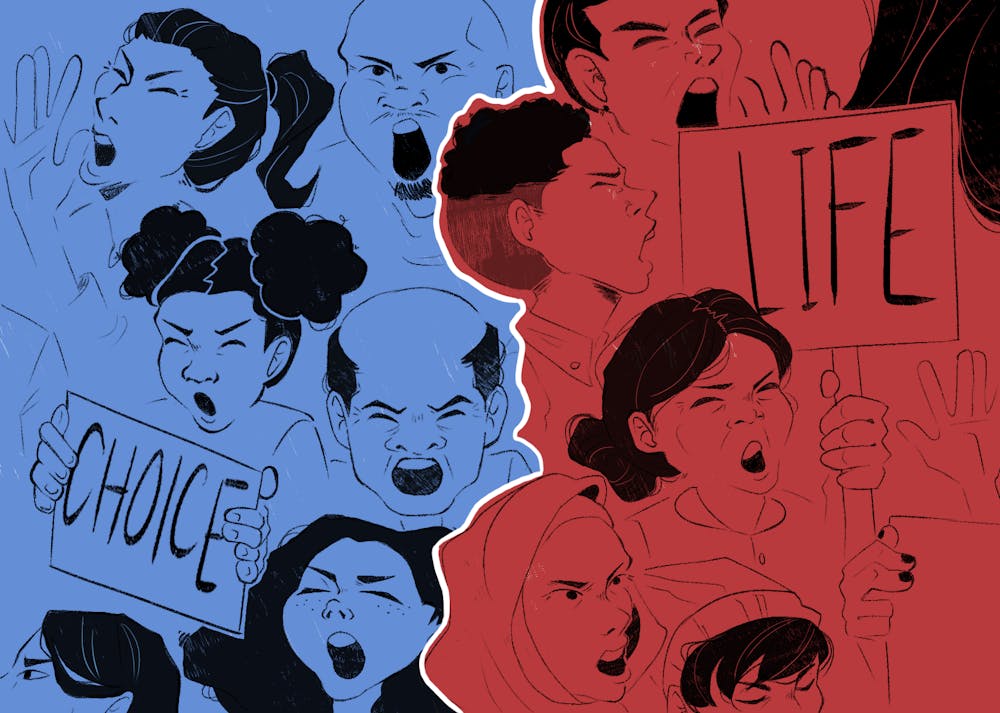A lot has happened since the Supreme Court overturned Roe v. Wade this summer, the 1973 case that held people have a constitutional right to abortion.
New guidelines from the Department of Education about pregnancy discrimination, a local court ruling about when the procedure can take place and a lawsuit already filed that challenges the local court ruling have all added to the ongoing debate over what policy Arizonans should follow.
Thursday morning, students held a walkout and protest to speak out against Arizona's abortion policy, that as it stands, is still up in the air.
The Pima County Superior Court ruled late in September Arizona can again enforce a ban on nearly all abortions, lifting a 1970s injunction that had blocked the ban for almost 50 years. According to the ruling, the only exception would be for cases in which a pregnant person's life is at risk. The next day, a law went into effect allowing doctors to provide abortions until the 15th week of pregnancy, not making exceptions for rape and incest.
For now, enforcement of the Pima County ruling is on hold. The ruling was blocked Oct. 7 when a three-judge panel in the Arizona Court of Appeals granted an emergency stay filed from Planned Parenthood Arizona. This allows Planned Parenthood to resume providing abortion procedures until the courts reach a final decision regarding the state's abortion restrictions.
"While today's ruling brings temporary respite to Arizonans, the ongoing threat of this extreme, near-total abortion ban that has no regard for the health care of those across the state, including survivors of rape or incest remains very real," said Brittany Fonteno, president and CEO of Planned Parenthood Arizona in a press release.
The Phoenix City Council also officially took a stand by voting in favor of a resolution condemning the U.S. Supreme Court's decision in Dobbs v. Jackson and opposing the enforcement Arizona's abortion restrictions. While the 6-2 vote does not change Arizona's existing abortion policy, those who violate state laws criminalizing abortion will likely not be prosecuted, and the Phoenix Police Department is encouraged to make calls regarding abortion law violations their lowest priority.
City Attorney Cris Meyer said it will be up to the Chief of Police to determine which laws it will enforce.
"It is up to the law enforcement officer to decide those priorities," Meyer said during the Phoenix City Council's Policy hearing on Tuesday. "The council can express their support or desire for what they want those policies to be, which is what this resolution does."
The vote was made a little over a week after the Phoenix Police Department emailed a memo instructing 911 dispatchers to not send a patrol car in response to reports about illegal abortion.
Since the Pima County ruling, Democrats and Arizona Attorney General Mark Brnovich have asked Gov. Doug Ducey to call a special session of the Legislature to clarify lingering confusion about which government decision takes precedence.
On Tuesday, Ducey told the Arizona Agenda, "this will be left to the courts."
With all of the moving parts, ongoing lawsuits and still no word on a possible special session, this is what we know about where abortion rights stand in Arizona.
Arizona Medical Association lawsuit
A lawsuit filed Monday by the American Civil Liberties Union and Perkins Coie LLP is on behalf of the Arizona Medical Association and plaintiff Dr. Paul Isaacson.
In the complaint, the plaintiff's representation argues there is "significant confusion" around Arizona's abortion policy and asks the state to consider the 15-week ban instead of a near-total abortion ban passed in 1901.
"Arizona courts have a duty to harmonize the Legislature's enactments as they exist today,” the plaintiffs argue. "The Territorial Law subjects physicians, including Dr. Isaacson and members of the Arizona Medical Association, to harsh criminal penalties of up to five years' imprisonment for providing healthcare services that have been legal in Arizona for nearly 50 years."
The 15-week ban, passed in March, and the territorial law do not provide exceptions for rape or incest, but both laws allow abortion if the pregnant person's life is at risk.
READ MORE: Pima County ruling allows enforcement of near-total abortion ban
The Arizona Medical Association said because Arizona's abortion policy is in limbo, doctors do not know "which actions are prohibited, and which are not," creating a "risk of arbitrary and discriminatory enforcement" of the law against those who help terminate pregnancies.
To resolve the insecurity of the rights of Arizona physicians, the association is requesting the court to provide the plaintiffs' attorneys fees and a judgment clarifying the policy that allows Arizona doctors to provide abortions.
Guidelines from DOE under Title IX
DOE guidelines state that under Title IX, schools and universities cannot discriminate against any student or employee based on the status of their pregnancy, including childbirth, a terminated pregnancy and recovery. Title IX is the federal statute protecting students and employees from sex discrimination in schools that receive federal funding.
READ MORE: The Department of Education said Title IX protects students seeking abortion
An ASU spokesperson said the University "already provides support for pregnancy and related conditions, as with other personal or medical circumstances that may affect students' pursuit of their educational goals."
The spokesperson recommended pregnant students contact ASU's Student Advocacy and Assistance department if they need resources but do not know where to start.
The guidelines also mandate schools have to treat pregnancy "the same as any other temporary disability" and provide a leave policy for pregnant students and employees if one does not exist.
ASU policy includes pregnancy and childbirth as viable reasons for employees to receive sick leave. If medically necessary, pregnant students are allowed to have excused absences, frequent trips to the restroom, opportunities to make up missed work, accommodations for temporary disability and tuition waivers if they are a resident or teacher's assistant.
These protections have existed since 1975 and the release of guidelines was intended to remind school communities of the policy, the DOE wrote in a statement Tuesday.
Students lead Thursday walkout
The Thursday walkout and protest, organized by students part of Young Democratic Socialists of ASU advocated for the Campus Assault Advocacy, Resources & Education Center and more reproductive health care resources on campus.
READ MORE: ASU explores family advocacy center as students push for CAARE Center
Almost 20 students gathered on the Tempe campus at the Memorial stage to protest.
Megaphone in hand, YDSA chair Sam Ndinjiakat, Jr. led chants including "keep your theology off my biology," "their body their choice," "abortion is a human right," and "shame on you ASU."
"There's also over 50 other campuses that are participating in this day of action in conjunction with the Graduate Student Action Network," said Ndinjiakat, Jr., a sophomore studying sociology and political science. "This is to basically call attention to the fact that reproductive justice is becoming a more pressing issue by the day, especially since Arizona literally just banned all abortions with exception of someone's life being in mortal danger."
Due to the disruptiveness of the megaphone and misuse of the Memorial stage, three ASU personnel spoke to Ndinjiakat, Jr. in an attempt to shut down the protest. Even when both the stage and megaphone were no longer in use, Mishi Estrada, an undergraduate studying landscape architecture, encouraged students to keep using their voices.
"As we said, please get involved, not just voting, get involved (on) campus, get involved in the healthcare here," Estrada said at the protest. "We can still try to make active decisions, even if they try to stop us from speaking out."
Eve Lagnese, a member of the Socialist Revolution at ASU, joined the walkout to show support for other students.
"It is the same thing (as) when we called for nationalized healthcare, it should not only be available, it should be accessible to every worker," Lagnese said. "Under the system we're on now, the capitalist one, it's still for profit even if abortion is legal."
Correction: A previous version of this story incorrectly stated the campus group Sun Devils Against Sexual Assault helped to plan the protest. The story was updated on Oct. 12 at 7:20 p.m. to correct the error.
Editor's note: This story was updated on Oct. 12 at 7:20 p.m. with additional information about the enforcement of the Pima County ruling and a Phoenix City Council resolution.
Edited by Piper Hansen, Wyatt Myskow and Grace Copperthite.
Reach the reporter at awaiss@asu.edu and @WaissAlexis on Twitter.
Like The State Press on Facebook and follow @statepress on Twitter.

Alexis Waiss is an assignment editor and senior reporter, covering breaking news and writing long-form stories. Alexis worked on SP's politics desk for a year, where she reported on the Legislature, higher education policy, student government, the city of Tempe and stories highlighting social justice. She previously worked as a fellow for the Asian American Journalist Association's VOICES program.




